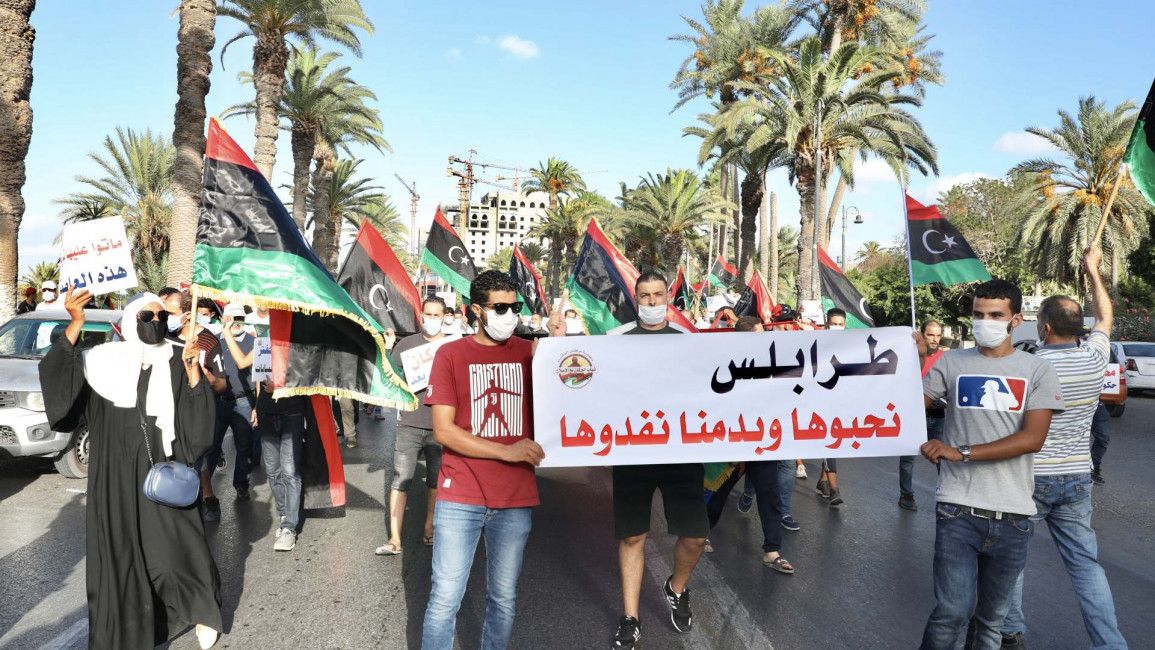Rights group: Libya militias used machine guns on protesters
Human Rights Watch said the militias used machine guns and vehicle-mounted anti-aircraft guns against protesters, allegedly killing one and wounding others in late August. At least 24 people, including a local reporter, were detained and beaten, it said.
"Political divisions and security concerns do not justify armed groups coming at protesters with machine guns and anti-aircraft weapons to intimidate them and disperse protests," said Hanan Salah, senior Libya researcher for HRW. "Tripoli authorities should investigate and publicly disclose the names of the armed groups and commanders who failed to comply with basic policing standards and hold them to account."
A government spokesman could not immediately be reached for comment.
Last month, hundreds of Libyans took to the streets of Tripoli and other cities under the UN-supported government of Prime Minister Fayez Sarraj to protest deteriorating economic conditions. At the time, Interior Minister Fathi Bashaga acknowledged that a militia group, which he did not name, had fired live ammunition at the peaceful protesters and that an investigation was underway. Subsequently, Sarraj briefly relieved Bashaga of his duties for questioning.
Earlier, Sarraj had said in a televised speech that protesters did not have a permit to gather and announced a 24-hour curfew to fight the coronavirus pandemic, a move that protesters believed was meant to keep them from rallying.
The New York-based rights group named three militias with ties to Sarraj's government as the perpetrators of the violations, including the Interior Ministry-linked Al-Nawasi Brigade, the Special Deterrence Force and General Security.
Militias have played a key role in Libya's civil war, with the UN-supported government employing an array of groups to fight their rivals in the east. The militias have proved difficult for the Tripoli government to control in the past.
Libya was plunged into chaos when a NATO-backed uprising in 2011 toppled longtime dictator Muammar Gaddafi, who was later killed. The county has since been split between rival east- and west-based administrations, each backed by armed groups and foreign governments.
Human Rights Watch said it interviewed 19 people, including demonstrators, their relatives and friends and examined photographs and video of security forces using excessive force.
HRW cited relatives and friends of two released protesters who were held in a military base for four days as saying both men told them they were tortured and forced to sign pledges that they would not engage in any future anti-government rallies. A recent media report said 13 protesters were released and that around eight remain in custody.
"Criminal justice authorities should promptly present all remaining detainees to a judge to determine the legality of their detention and should either charge them promptly with a crime or release them, as detention before trial should be the exception not the rule," the HRW report said.
Meanwhile, the UN mission in Libya said Thursday that lawmakers from the country's rival administrations agreed to hold presidential and parliamentary elections after an 18-month transitional period.
After three days of UN-sponsored talks in the Swiss city of Montreux, the delegations reached a "consensual view" on the need to form a national unity government that would be in charge of providing services to the Libyan people and to create "the necessary conditions" for the holding of national elections, said the statement. The parties also agreed on reforming" the Tripoli-based government — which can effectively lead to replacing Sarraj.
The UN mission commended "the goodwill and national dedication of the Libyan participants who seized this opportunity to put aside their longstanding differences and disputes to recommend a Libyan-Libyan solution that can be put on the table".
Libya's dueling governments recently resumed talks after each declared a unilateral cease-fire, following nearly 15-month of fighting that culminated in the direct involvement of foreign powers and threatened to turn the conflict into a protracted proxy war. Similar talks between Libyan politicians have been underway since Sunday in the Moroccan city of Bouznika.
The UN mission said the participants proposed temporarily moving key government offices to the contest city of Sirte, which is still under control of forces allied with Libya's east-based administration. The Tripoli-based government had previously urged the demilitarisation of the strategic city, which stands as the gateway to the country's oil fields.
The UN also urged the international community to fully support negotiations between Libya's warring sides and "to shoulder its responsibilities to support this process and to unequivocally respect the Libyan people's sovereign right to determine their future".
The US Embassy in Libya welcomed "the constructive" talks between the Libyan rivals and hailed the U.N.'s "tireless efforts" to end the conflict.
"We are confident that a brighter future is possible as responsible Libyan parties come together in peaceful dialogue and with full respect for Libya's sovereignty," the embassy said.
Follow us on Facebook, Twitter and Instagram to stay connected



